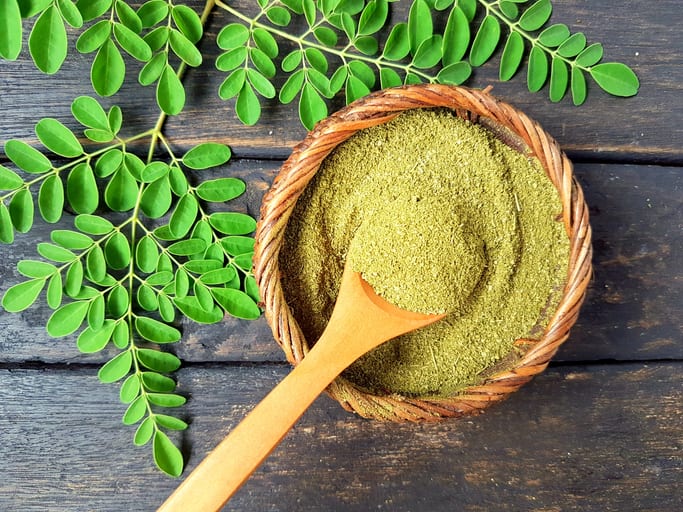If You Like Turmeric, You’re Going to Love Moringa
November 18, 2018

For thousands of years, people all over the world have been enjoying the health benefits of moringa. A tree native to the sub-Himalayan regions of Afghanistan, India, Bangladesh, and Pakistan, moringa oleifera has also been grown in various tropical areas of the world.
How Can Moringa Be Used?
For centuries, the plant’s roots, flowers, seeds, bark, and fruit have been used for medicinal purposes. This versatile tree can help treat a variety of conditions — from asthma and arthritis to kidney stones and thyroid disorders. Because moringa leaves retain much of their nutritional value when dried, the plant is also an important food source for people in developing countries. Important: eating the moringa root and its extracts should always be avoided, as this can be toxic.
Moringa Health Benefits: The Ultimate Superfood
In addition to antioxidants, moringa contains essential minerals, proteins, and vitamins. Moringa powder can be added to afternoon smoothies for a boost of nutrition, or, you can try drinking moringa tea to help jumpstart your morning. What makes moringa such a popular superfood?
1. It’s an Antioxidant
Moringa contains antioxidants that can interact with the harmful free radicals in your body and help reduce blood pressure. Vitamin C, quercetin, beta-carotene, and chlorogenic acid are found in high levels in moringa leaves. One study showed that women who took just 1.5 teaspoons of moringa powder every day for three months had significantly higher levels of antioxidants in their blood. There are plenty of foods that boost your immune system: maybe it’s time to add moringa to your list of household staples!
2. It Reduces Inflammation
Moringa can reduce the amount of inflammation in your body by suppressing the enzymes associated with it. While inflammation is your body’s natural response to an injury and is necessary for healing, its presence can also harm your health if it continues for an extended amount of time. This type of continued inflammation has been linked to chronic conditions such as arthritis, obesity, diabetes, and heart disease.
3. It Manages Diabetes Symptoms
In addition to regulating oxidative stress in those with diabetes, moringa can also help control their glucose and lipid levels. While scientists are still conducting studies to find out which of the plant’s compounds help reduce blood sugar levels, many think the isothiocyanates compound is responsible. Even the smallest studies are bringing attention to the potential of this plant.
One study in particular showed that eating 50 grams of moringa leaves each day for three months could reduce blood sugar levels by 21%.
4. Moringa Can Decrease Cholesterol Levels
A number of studies on both animals and humans have indicated that moringa’s crude leaf extract has impressive cholesterol-reduction abilities. An increased risk of heart disease and high cholesterol go hand-in-hand, so reducing the risk of one automatically reduces the risk of the other. A plant-based diet significantly lowers cholesterol levels and promotes heart health. Flaxseeds, oats, almonds, and of course, moringa, are all cholesterol-lowering superfoods.
5. It Improves Skin Health
Applied to the skin, moringa can help reduce the effects of athlete’s foot, warts and skin infections. There is also some evidence that shows moringa is effective at treating gum disease and dandruff. The plant’s blood-clotting capabilities make it an option for healing wounds and cuts as well.
The health benefits of this remarkable plant are seemingly endless — take in the research to see if it might be a good fit for you. Before adding this or other supplements into your lifestyle, be sure to consult with a healthcare professional to be fully informed of any side effects or concerns.
